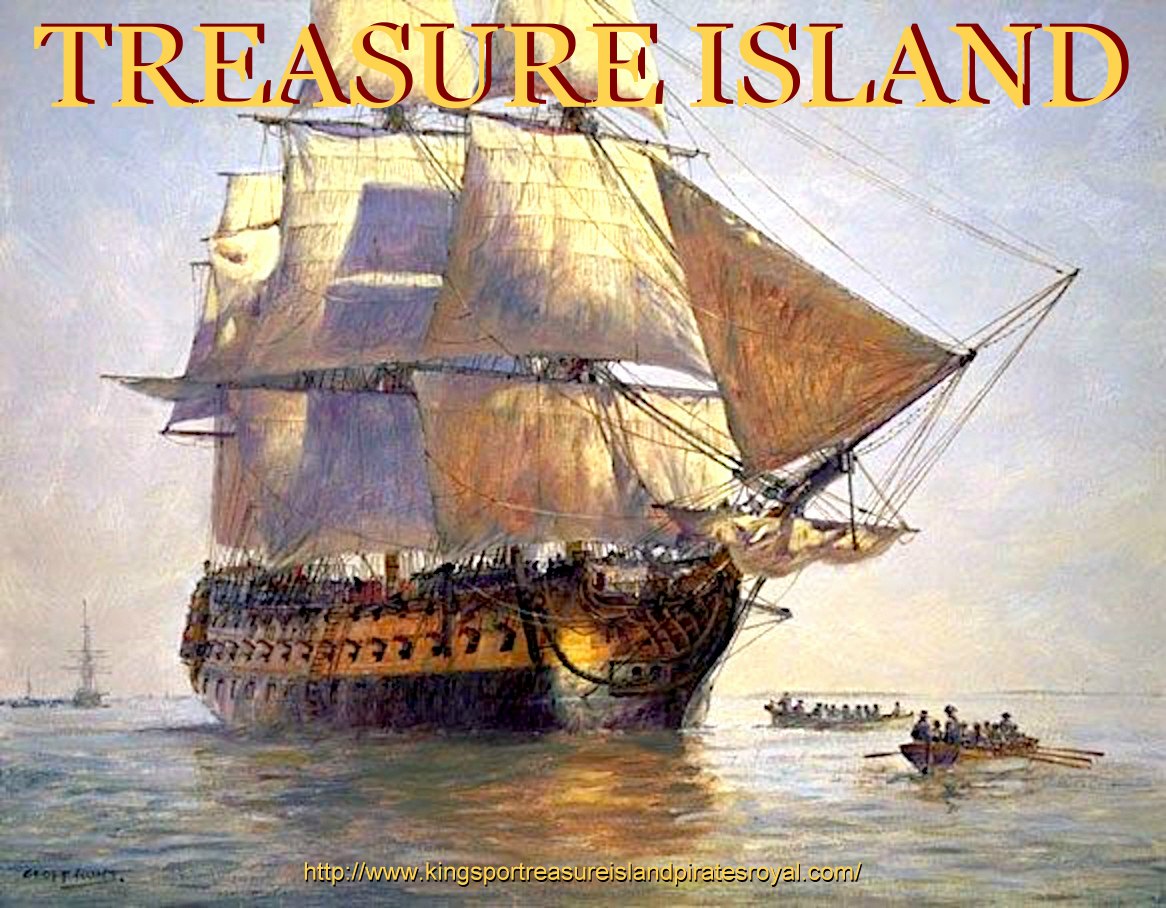|

John
Storm find's Captain Henry Morgan's sunken treasure ship, on a reef just off
Skeleton Island.
Davy Jones’s Locker is a metaphor for the oceanic abyss, the final resting place of drowned sailors and travelers. It is a euphemism for drowning or shipwrecks in which the sailors’ and ships’ remains are consigned to the depths of the ocean1. The origins of the name of Davy Jones, the sailors’ devil, are unclear, with a 19th-century dictionary tracing Davy Jones to a “ghost of Jonah.” Other explanations of this nautical superstition have been put forth, including an incompetent sailor or a pub owner who kidnapped sailors.
The earliest known reference to the negative connotation of Davy Jones occurs in “The Four Years Voyages of Capt. George Roberts,” by
Daniel Defoe, published in 1726. An early description of Davy Jones occurs in Tobias Smollett’s “The Adventures of Peregrine Pickle,” published in 1751, where Jones is described as having saucer eyes, three rows of teeth, horns, a tail, and blue smoke coming from his nostrils.
In maritime folklore, Davy Jones is often depicted as an evil spirit presiding over all the evil spirits of the deep, and is sometimes seen perching among the rigging on the eve of hurricanes, shipwrecks, and other disasters to which seafaring life is exposed, warning the devoted wretch of death and woe.
The term has been popularized in modern culture, notably in the “Pirates of the Caribbean” film series, where Davy Jones is portrayed as the legendary captain of the ghost ship
Flying
Dutchman. In the movies, he is depicted as an octopus-faced man with tentacles and saucer eyes, with his heart kept in a chest as a forever memory of his love’s betrayal.
Long before the movie Pirates of the Caribbean, the story of Davy Jones and his locker found its place in several books, particularly works that talks about pirates.
The phrase “Davy Jones’s Locker” is used by sailors to denote the afterlife of seafarers or even objects, including ships destined to rest at the ocean’s
bottom. It remains a part of English language nautical jargon and continues to be referenced in literature, film, and other forms of storytelling.

PIRATES
OF THE CARIBBEAN
At World’s
End: “Do you fear death?” often asked Davy Jones, the legendary captain of the ghost ship Flying Dutchman, in the movie Pirates of the
Caribbean.
In the Disney movie series, 'Davy Jones' is a fictional character depicted
as an octopus-faced man with mulitples of tentacles and saucer eyes, with his
beating heart kept in a wooden chest as a forever memory of his love’s
betrayal. Davy Jones is a cruel pirate sailor with everlasting greed for violence.
it is for this reason, that for many people today, this octopus-faced Davy Jones comes to mind when somebody mentions ‘Davy Jones’ Locker.’ For the observant, of course, Davy Jones’ Locker is from where Jones raises the Black Pearl after making a pact with Jack Sparrow in the movie.
But there are many other movies, novels, and poems that have told us the story of Davy Jones Locker.
OTHER REFERENCE
According to the mythology of sailors, the phrase
“Davy Jones’s
Locker” is an idiom that refers to the seabed, the resting place of thousands of sailors who drowned at sea.
Because, there are hundreds of thousands of souls there under.
Sailors use the phrase to denote the afterlife of seafarers or even objects, including ships
as wrecks destined to rest at the ocean’s bottom. Titanic,
the great ship sunk by an iceberg, is one such wreck.
In its euphemistic sense, the phrase has been part of the English language for a long period, and the origin of the word remains
disputed, as part of the fun associated with such superstitions.
In the earlier times, the name-Davy Jones was referred to as the sailors’ devil and, sometimes, the evil god of the seas.
The prominent among these tales, that appear in movies and writings, is the story of Jones as the captain of the mysterious ghost ship
‘The Flying Dutchman.” He was also responsible for ferrying the souls to the other world and could set foot on land after a decade and reunite with Calypso, the sea goddess. However, when he came back, she was not there.
The Flying Dutchman, is a mainstay of maritime lore, a legendary ghost ship doomed to sail the oceans forever since it can’t make port due to the rough waters.
In another version of this nautical yarn, Davy Jones refers to David Jones, a pirate captain who sailed his ship across the
Indian Ocean in the 1630s.
But many historians reject its possibility by arguing that the person mentioned in this story was not popular enough to become a legend, as is Davy Jones.
Who knows?
A publican who had run a British pub, named Davy Jones, tells another story. This avatar of Davy Jones used to make his customers drunk and imprison them in his ale locker only to sell them off to passing ships as enslaved people.
The British pub owner later became a pirate after he went bankrupt. Stealing a ship, he went on to sail across the
Atlantic Ocean and capture other ships and their crew abroad. While he decapitated most crew members, the remaining were locked before the vessel sank.
Another such interpretation points to a 19th-century dictionary that refers to the name as a “ghost of Jonah,” the biblical seaman whose name meant
very bad luck to sailors.
According to the 'Bible,' 'God' punished Jonah for his disobedience, and he became the “devil of the seas,” after which the crew aboard his vessel killed him.
Another version of the Jonah story refers to the prophet who spend a few days inside the whale and connects his days in the tract of a whale with
'Davy Jones’ Locker.
Among the Welsh seafaring community, Davy Jones refers to their patron saint – Saint David, whom they believe saves them from the ocean’s harsh nature. According to this legend, St. David will only protect the good sailors, while the immoral seafarers would be sent to Davy Jones’ Locker.
Sounds fair! It's another version of St. Peter at the Pearly Gates in
heaven.
During the 19th century, Davy Jones and his locker appeared in some naval
adventure fiction. Washington Irving’s Adventures of the Black Fisherman, published in 1824, and Edgar Allan Poe’s 1835 novel King Pest are prominent examples of such works.
Herman
Melville’s classic novel Moby-Dick, published in 1851, Charles
Dickens’s Bleak House (1852-1853), and Robert Louis
Stevenson’s work published in 1883, Treasure
Island, are other 19th-century works that mention Davy Jones.
Ahoy!
|